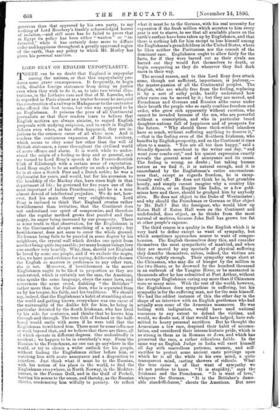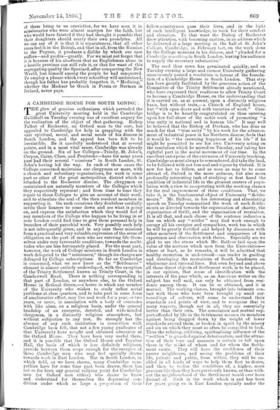LORD REAY ON ENGLISH UNPOPULARITY. T HERE can be no doubt
that England is unpopular among the nations, or that this unpopularity pro- duces some grave consequences. It frequently, to begin with, disables foreign statesmen from doing us justice even when they wish to do it, as, to take two trivial illus- trations, in the Lothaire case and that of M. Laroche, who is regarded in Paris almost as a traitor because he assigned the construction of a railway in Madagascar to the contractor who offered the best terms, but who was supposed to be an Englishman. It poisons the pens of all Continental journalists so that their readers learn to believe that English motives are always sinister, to regard English proposals with undying suspicion, and to exult in English defeats even when, as has often happened, they are in- jurious to the common cause of all white men. And it renders the continuous expansion of British territory, which seems to obey some law other than the will of British statesmen, a cause throughout the civilised world of acute offence and alarm. It is worth while to under- stand the origin of a feeling so deep and so general, and we turned to Lord Reay's speech at the Franco-Scottish Club of Edinburgh with a certain sense of expectation. Lord Reay ought to be an authority on such a subject, for he is at once a Scotch Peer and a Dutch noble ; he was a diplomatist for years, and would, but for his accession to the headship of the Mackay clan, have risen high in that department of life ; he governed for five years one of the most important of Indian Presidencies ; and he is a man almost devoid of intellectual prejudice. We do not, how- ever, find his main theory very enlightening. Lord Reay is inclined to think that England creates rather bewilderment than irritation, that the Continent does not understand our spirit of compromise, and therefore after the regular method grows first puzzled and then angry, its anger being increased by our prosperity. There is some truth in that observation, for the Englishman is to the Continental always something of a mystery ; but bewilderment does not seem to cover the whole ground. No human being fails to be puzzled in some degree by his neighbour, the crystal wall which divides one spirit from another being quite impassable; yet many human beings love one another very heartily. Why, then, should not England be loved by some one people, and if we exclude the negro, who, we have good evidence for saying, deliberately chooses the English as masters in preference to any other race, she is not. Moreover, if bewilderment is the secret Englishmen ought to be liked in proportion as they are understood, which is certainly not the case, the American, who speaks the same language, obeys the same laws, and reverences the same creed, disliking "the Britisher" rather more than the Italian does, who is separated from us by his tongue, his faith, and his traditions. We should say, indeed, that the Englishman's habit of stumbling about the world and getting known everywhere was one cause of the universality of the dislike felt for him, he being in particular detested by the South Irishman, who has lived by his side for centuries, and thinks that he knows him through and through. The true Celt of Ireland or the half- breed would smile with scorn if he were told that the Englishman bewildered him. There must be some influence at work beyond that, and we believe that there are three, all of which operate in different degrees. One undoubtedly is accident ; we happen to be in everybody's way. From the Russian to the Frenchman, no one can go anywhere in the world, or try to obtain a wider outlook for his people, without finding the Englishman either before him, or watching him with acute annoyance and a disposition to interfere. Just think what it must be to the Russian, with his notion of his place in the world, to find the Englishman everywhere, in North Norway, in the Mediter- ranean, in the Persian Gulf, and in the Gulf of Pecheli, barring his access to the ocean, and thereby, as the Russian thinks, condemning him wilfully to poverty. Or reflect what it must be to the German, with his real necessity for expansion if the fresh million which accretes to him every year is not to starve, to see that all available places on the earth's surface have been taken up by Englishmen, and that there is nothing left for him except to lose himself among the Englishman's grandchildren in the United States, where he likes neither the Puritanism nor the conceit of the dominant race. Englishmen ought to allow fairly for the facts, for if they were barred out as their rivals are barred out they would fret themselves to death, or begin conquering as they do whenever they find dark races in their way.
The second reason, and to this Lord Reay does attach some, though not sufficient, importance, is jealousy,-- the master-passion of all the Continental peoples. The English, who are wholly free from the feeling, replacing it by a sort of sulky pride, hardly understand how other races can be moved by it ; but they are moved, and Frenchman and German and Russian alike curse under their breath the people who so easily combine freedom and order, who grow rich apparently without exertion, who cannot be invaded because of the sea, who are powerful without a conscription, and who in particular breed daughter-nations full of happiness and of prospects for the future. "Why should these thick-witted islanders have so much, without suffering anything to deserve it," —that is the feeling even of the Southern Irishman, who benefits by English prosperity, and on the Continent it rises often to a mania. "You are all too dam happy," said a friendly Spanish merchant to the writer one day, "and want your combs cut," and his quaint expression exactly reveals the general sense of annoyance and its cause. The feeling is wrong, no doubt ; but taking human nature as we find it, it is natural enough, and it is exacerbated by the Englishman's entire unconscious- ness that, except as regards freedom, he is excep- tionally well off. He does not think he is, but grumbles hourly, and simply cannot imagine why a country like South Africa, or an Empire like India, or a few gold- mines here and there, should be grudged him by anybody alive. He does not object to the Duke of Westminster ; and why should the Frenchman or German or Slav object to Mr. Bull ? But the foreigner, who would blow up Eaton Hall if Eaton Hall were on the Continent and undefended, does object, as he thinks from the most natural of motives, because John Bull has grown too fat at other people's expense.
The third reason is a quality in the English which it is very hard to define except as want of sympathy, but which sometimes approaches nearer to want of compre- hension. The English themselves deny this, and consider themselves the most sympathetic of mankind, and when they are moved by any spectacle of physical suffering they describe themselves, unless, indeed, the victims are Chinese, rightly enough. Their sympathy stops short at the Chinaman, who may die of hunger by the million in the two Shans, or be drowned by the hundred thousand in an outbreak of the Yangtse River, or be massacred in thousands after he has submitted at Port Arthur, without the average Englishman caring any more than if Chinamen were so many mice. With the rest of the world, however, the Englishman does sympathise in suffering, but his sympathy is for the suffering man, not for the man himself. We had the oddest instance of this the other day in the shape of an interview with an English gentleman who had actually seen some of the Armenian massacres. He was boiling with indignation, would have used national resources to any extent to defend the victims, and would, we doubt not, if that would have helped, have sub- mitted to heavy personal sacrifices. But he thought the Armenians a low race, despised their habit of accumu- lation, and considered their intense historic pride, which is as strong in them as in Romans or Jews, and which has preserved the race, a rather ridiculous foible. In the same way an English Judge in India will exert himself all day with marvellous patience, acumen, and self- sacrifice to protect some ancient caste privilege upon which he is all the while in his own mind, a quite transparent mind, casting showers of ridicule. What the true cause is of that want of sympathy we do not profess to know. "It is stupidity," says the Irishman and the Frenchman. "It is want of love," whispers the German. "It is the Britisher's damn- able standoffishness," shouts the American. But none of them bring to us conviction, for we have seen it in missionaries who were almost martyrs for the faith, but who would have fainted if they had thought it possible that their daughters should marry their own proselytes. All we can say of it is that it is separateness, that all other races feel it in the British, and that in all, from the Russian to the Peguan, it produces a dislike by which our race suffers—and profits—greatly. For we must not forget that it is because of his aloofness that an Englishman alone in a hostile province can still rule it, or that for want of this segregating quality the Spaniard, after conquering the New World, lost himself among the people he had conquered. To employ a phrase which every schoolboy will understand, though his father has probably forgotten it, " Medising," whether the Mediser be Greek in Persia or Norman in Ireland, never pays.







































 Previous page
Previous page